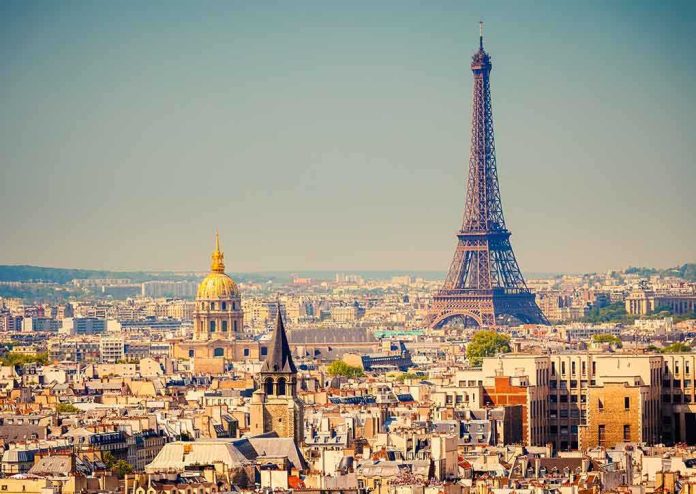
A former French president—once the toast of global diplomacy—will now trade the corridors of power for a prison cell, as the world watches a legacy unravel under the weight of criminal conspiracy.
Story Snapshot
- Nicolas Sarkozy is set to begin a five-year prison term for criminal conspiracy tied to illicit Libyan campaign funding.
- The verdict marks an unprecedented moment in modern French political history.
- The case exposes the dark interplay of global power, money, and political ambition.
- The scandal continues to ripple through European and Middle Eastern politics.
A French President Behind Bars: A Shocking Precedent
France has seen its share of political intrigue, but no living memory compares to the image of Nicolas Sarkozy, once president and master negotiator, preparing to serve a five-year prison sentence. The charges stem from a scheme to obtain campaign funds from Muammar Gaddafi’s regime, a relationship that once played out in gilded Parisian halls and now lands in the stark reality of a prison cell. The symbolism is stark—the French Republic, proud of its revolutionary legacy, now sees one of its own leaders humbled by the justice system.
This seismic event reverberates far beyond Sarkozy’s personal fate. It signals to the French public and the world that immunity for the political elite is not absolute. The spectacle of a former head of state facing real consequences is both unprecedented and, to many, overdue. The French judiciary’s decision to enforce the sentence sends a message: no matter how high one rises, the law remains the ultimate equalizer. The case will likely become a touchstone in debates about political accountability not only in France but across Europe, where public trust in institutions has eroded under repeated corruption scandals.
The Gaddafi Connection: Ambition, Money, and International Fallout
The roots of Sarkozy’s downfall trace back to the shadowy corridors of Franco-Libyan relations during the 2007 presidential campaign. Investigations uncovered a web of clandestine meetings, opaque financial transfers, and improbable alliances. French investigators alleged that Sarkozy’s campaign received millions in illicit funds from Gaddafi, the same dictator who would be toppled with Western support just a few years later. The irony is rich—money changing hands in secret, only to later fuel a war that ended with Gaddafi’s own brutal demise.
The details uncovered in court exposed not just personal ambition, but the lengths to which a candidate might go to secure victory. The case forced the public to confront uncomfortable truths about the proximity of Western democracies to authoritarian money and influence. It also raised questions about how political campaigns are financed, and whether the allure of power has distorted the moral compass of those at the very top. For seasoned observers, the Sarkozy-Gaddafi saga is a parable of hubris, ambition, and the unpredictable boomerang of international intrigue.
🚨🇫🇷 FORMER FRENCH PRESIDENT SARKOZY BEGINS FIVE-YEAR PRISON SENTENCE
Nicolas Sarkozy has reported to La Santé prison in Paris to begin serving a five-year sentence for conspiring to raise campaign funds from Muammar Gaddafi’s Libya.
He’s the first French leader to be jailed… https://t.co/fxBMJY8UY7 pic.twitter.com/wPCNA9noFl
— Mario Nawfal (@MarioNawfal) October 21, 2025
France’s Political Culture on Trial
Sarkozy’s sentencing has triggered a broader reckoning with the culture of impunity that has long shadowed French politics. For decades, French presidents and ministers operated with a degree of legal protection that seemed unassailable. This case marks a turning point, as even the highest office offers no shield. Political rivals and allies alike have scrambled to interpret the fallout—some warn of witch hunts, others hail a new era of transparency. The public, meanwhile, is left to weigh cynicism against hope that this marks the start of deeper reform.
The sentence’s impact will be felt in every corner of French political life, from campaign finance laws to the conduct of future leaders. It may also embolden prosecutors and journalists to pursue other cases with renewed vigor. As France prepares for upcoming elections, the shadow of Sarkozy’s conviction will loom large, shaping debates about integrity, accountability, and the true meaning of public service.
Global Reverberations and the Question of Legacy
This story is not just French—it is global. Sarkozy’s ties to Gaddafi, his role in NATO’s intervention in Libya, and his influence on European policy have all come under renewed scrutiny. Allies in Europe and adversaries in the Middle East will parse the meaning of his downfall, searching for lessons or leverage. The signal to other leaders is clear: international deals, no matter how secret, can eventually come to light. The legacy of Nicolas Sarkozy, once defined by ambition and energy, will now be forever intertwined with a cautionary tale of hubris—and the inescapable reach of the law.
The world watches as France turns a page in its political story. Whether Sarkozy’s fate marks a true turning point or just another momentary scandal will depend on what comes next: will France’s institutions seize the opportunity for reform, or will old habits persist beneath a new veneer? Either way, the message lingers—power is fleeting, but accountability has a long memory.
Sources:
France’s former President Sarkozy will begin serving a 5-year prison sentence Tuesday












